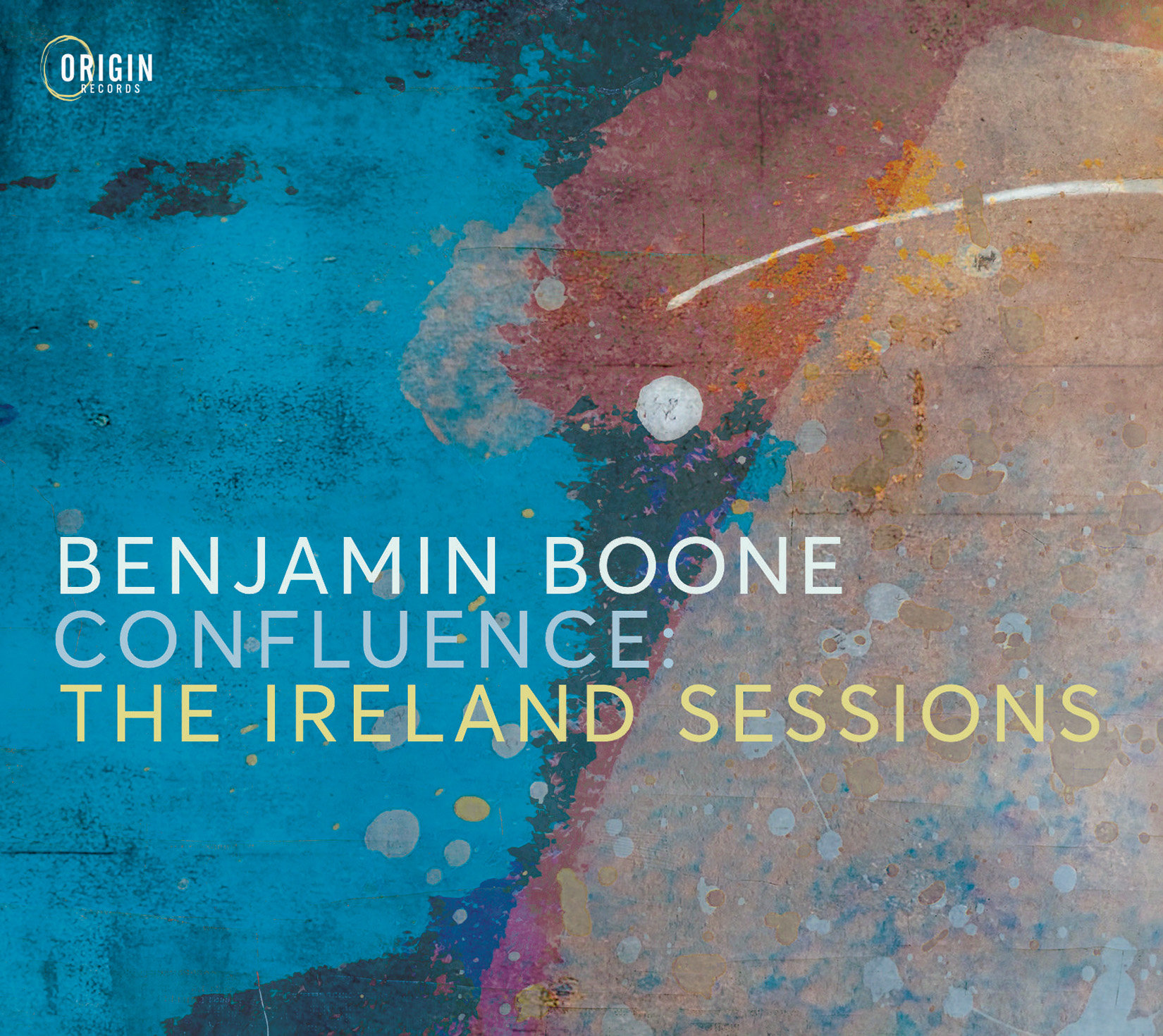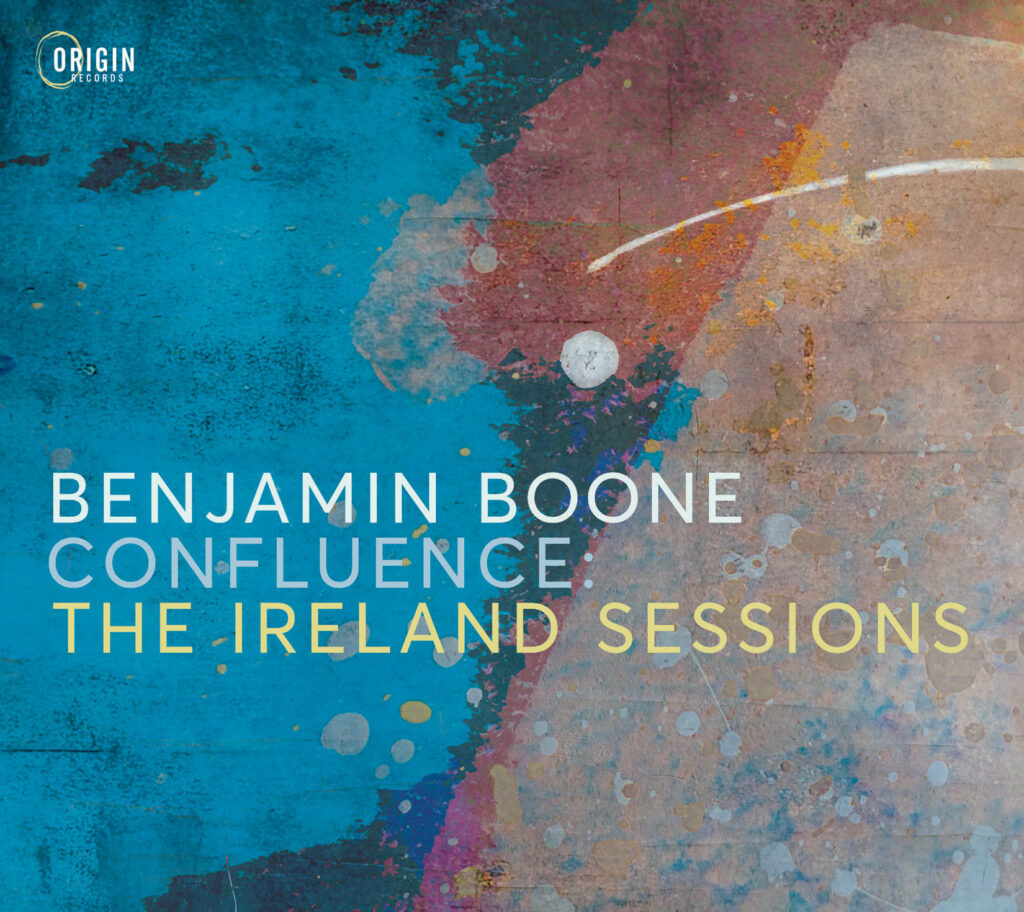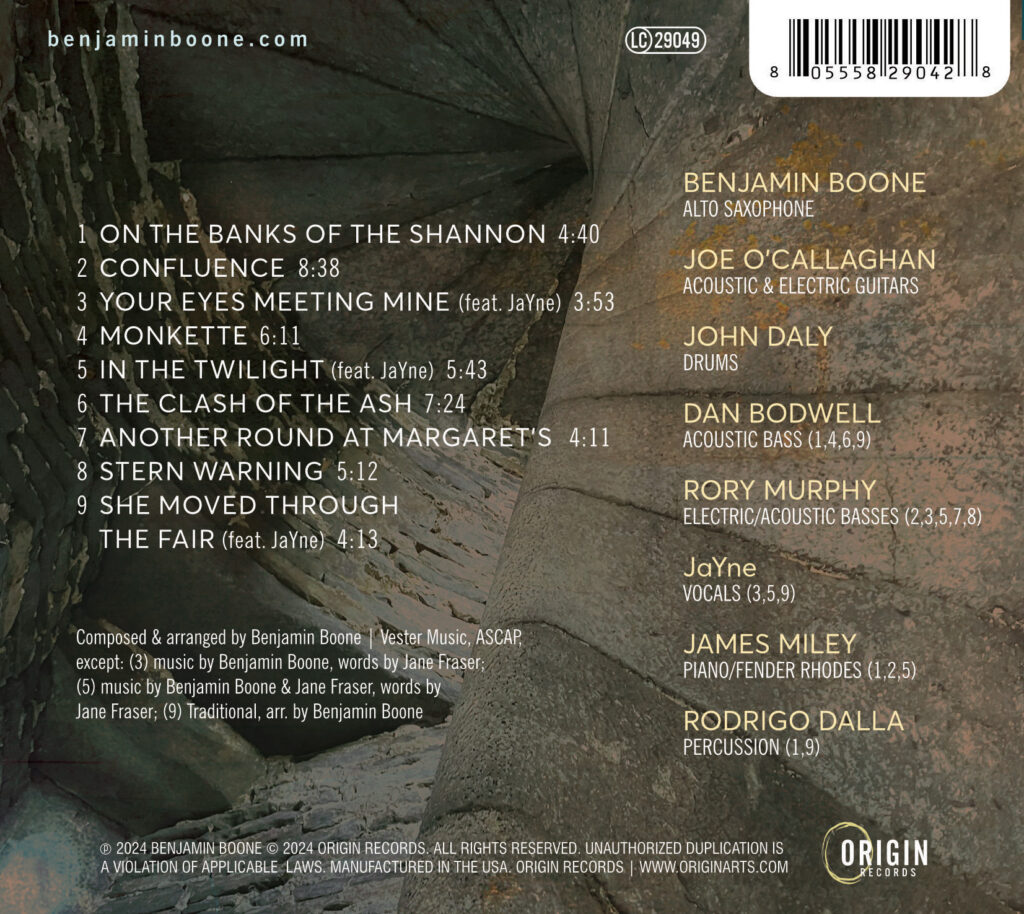Description
SAXOPHONIST BENJAMIN BOONE CONTINUES TO EXPLORE NEW TERRITORY ON CONFLUENCE, A COLLABORATION WITH IRISH MUSICIANS, WRITTEN AND RECORDED IN LIMERICK, IRELAND
LINER NOTES BY JASON CRANE
“A mind that is stretched by a new experience can never go back toits old dimensions.” ~ Oliver Wendell Holmes
“It’s not that the Irish are cynical. It’s rather that they have a wonderful lack of respect for everything and everybody.” ~ Brendan Behan
The Oliver Wendell Holmes quote is loftier, but the Brendan Behan quote gets closer to the heart of the matter on saxophonist Benjamin Boone’s new album Confluence: The Ireland Sessions, which finds Boone exploring the musical and cultural legacies of Ireland without taking too precious a view of anything.
That’s not to say this isn’t serious music, or that these aren’t serious players. It is, and they are. It’s more that tunes like “The Clash Of The Ash” or “Another Round At Margaret’s” suggest Boone’s appreciation for Ireland without needing to turn everything into a reel. The album also opens a window to the ways in which jazz has truly become a global music, as Boone finds himself in the company of Irish musicians who feel just as at home in this quintessentially American art form as any child of Detroit or San Francisco or New York or Chicago.
Confluence is the result of a Fulbright Fellowship Boone received to research and teach at the University of Limerick’s Irish World Academy of Music and Dance from 2022-23. The idea, said Boone, was to “immerse myself in the Academy and the culture for a year, play with lots of folks, then collaborate on the composition and recording of new works.” That led to this album and two upcoming ones – each with different musicians and in different styles.
This album’s opening track, “On The Banks Of The Shannon,” reflects the setting in which most of this music was written: “In a room at the Irish World Academy,” said Boone, “with a wood floor, high ceilings, a grand piano, and an expansive window overlooking the mystical Shannon River.” And despite the earlier protestations against seriousness, it must be noted that this tune brings the mystical river to life, both through its melody and through its liminal approach to timekeeping. Is this what it feels like to look from a window at the Shannon River? It doesn’t matter. It’s what it ought to feel like, and that’s more than enough.
If Boone the composer is one side of the coin, then the other side is Boone the saxophonist, and that side is delightfully present throughout the album, even as he allows his companions plenty of time to come to the fore. Boone clearly has such command of his horn that his ideas can flow out in an effortless stream of consciousness. Listen, for example, to the on-a-dime shift in mood during his solo on “The Clash Of The Ash.” One minute his lines are snake-like, the next moment roaring. On “Your Eyes Meeting Mine,” Boone rises up out of the vocals to lift the song to new heights, then passes off his spontaneous creation to the guitar before taking up the mantle again and then leading back to the vocal, ever in service of the song, not the spotlight.
Speaking of “The Clash Of The Ash,” it’s important to note that Boone’s visit to Ireland was more than just musical, it was cultural in a wider sense. The song title is a common term for one of the oldest field games in the world, the ancient sport of hurling (Iománaíocht in Irish) and refers to the ash hurleys (paddle-like sticks) violently striking each other. The game has been popular in Ireland for at least 3,000 years, and Boone received his indoctrination into its mysteries from drummer John Daly, and soon became a rabid Limerick fan. While this made Daly happy, it was less well received by Tipperary fanatic and guitarist Joe O’Callaghan. “The Clash” captures the incredible athleticism of the game, replete with exciting twists, turns, clashes, pile-ups, and even a victory-winning goal at the end. And who is cheering loudly alongside Boone? None other than his Limerick neighbor, the very “Margaret” referred to in the humorous and well-lubricated tune, “Another Round At Margaret’s.”
Boone’s companions on Confluence bring both strong individual voices and a clear willingness to serve the music first. Guitarist O’Callaghan in particular shines throughout. Listen to his inventive solos on the title track and “Stern Warning,” to name just two standout moments. O’Callaghan is a skilled improviser who isn’t beholden to any particular idea about what a “jazz tone” should be. He often roars out of the speakers with a fierceness that elevates the music, but he’s equally at home doubling melody lines or creating ethereal sound worlds. Daly, who in addition to being a hurling fan also runs the Limerick Jazz Festival, and the bass team of Dan Bodwell and Rory Murphy (who trade off throughout the album) are locked in from start to finish, whether they’re being called on to power a fast-paced burner (see the aforementioned “Stern Warning”) or to set the table for a more subtle, searching song, like “She Moved Through The Fair.”
And that brings us to Jane Fraser, aka JaYne, who sings on “She Moved Through The Fair,” “Your Eyes Meeting Mine,” and “In The Twilight.” Fraser is a Limerick native whose musical tastes run from jazz to soul and back again, a fact that serves her well against the backdrop of the musicians on Confluence. Fraser’s understated approach to “She Moved,” in particular, invests the song with a melancholy that makes it one of the highlights of the album. Listeners might be familiar with this ancient Irish folk song, given that it’s been recorded through the years by everyone from Wayne Shorter to Led Zeppelin to Sinéad O’Connor.
This project might illustrate these Irish musicians’ comfort with an American art form, but Boone was also careful to point out the influence goes the other way, too: “There is a strong connection between Irish music and jazz, ” said Boone. “Irish workers in the US actually influenced the development of jazz. They lived shoulder to shoulder with emancipated black workers, and they influenced each other’s music. Some types of Irish music actually have a ‘swing’ feel that predated jazz swing; and much of Irish trad music has constant spun-out rhythms like lots of improvisations in jazz.” And it doesn’t take long at a traditional Irish session to hear the same kind of melodic fluency that the best jazz players bring to their craft.
In the end, Confluence isn’t an Irish-American or American-Irish project. It’s yet more proof, like Boone’s 2020 Origin Records album, Joy (recorded in Accra with the Ghana Jazz Collective), that the inherent magic of music lies in its ability to transcend all barriers. With Confluence, Boone has crafted a fun, smart, engaging, and often moving collection, played by a group of musicians whose countries of origin inform their playing without controlling it. And we, the listeners, are transported – sometimes, yes, to Ireland, but more often to that mystical shore (perhaps along the Shannon?), where all the best music resides.
Liner Notes by Jason Crane











